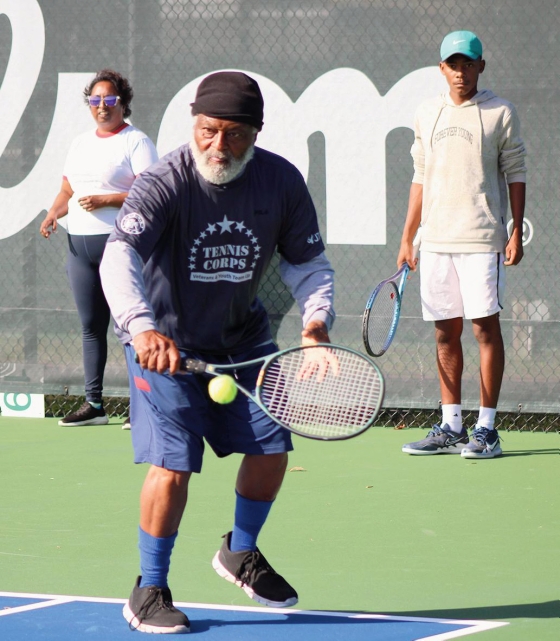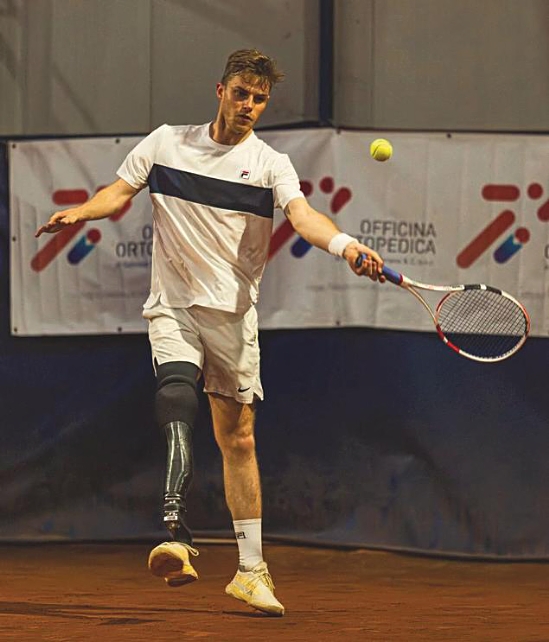

RETURN ACES: (Above left) Sam Williams hitting a backhand at the Veterans Day Tennis Celebration in 2022; (Above right) Nicky Maxwell at the Para Standing International tennis tournament in Turin, Italy
the ball and developing contact perception. Duct tape was placed on the strings to concentrate his focus on the contact of the ball, rather than where the ball landed in the court. Not only did this provide a visual cue, but also an auditory one. Dance moves were suggested by Daniela Corona, one of the junior assistant coaches, to teach the cross step recovery process. The JTCC coaches are creative in their means to communicate and convey all the nuances of the game. The traditional way of teaching an idealized “version” of a tennis stroke must be adapted for the adaptive player.
Ken Rodriguez, aka “Rocket Rod” came into the program via Adaptive Tennis US, a nonprofit program training military veterans, founded by Karl Lee. Rocket had never been taught tennis before he stepped on the court in December of 2021. He was injured on the USS John Stennis aircraft carrier, by a helicopter which ran over his right leg, resulting in the loss of his limb below the knee. Rocket played as a pitcher and catcher at the AA level in Puerto Rico, so he was a developed athlete, although he did not have a tennis background. Rocket is a dedicated player, training three to four times per week at JTCC. He works on learning all aspects of the game and playing matches against some of the junior tennis champions. The volunteers are instructed to not hold back any aspect of their game, but rather to play as hard as possible to test their partner. In July, Rocket is scheduled to compete in a national level tournament against other para standing tennis players.
Another high caliber player of the JTCC program is Nicky Maxwell. Originally from England, Nicky is a graduate student who was a D1 track athlete at Harvard. He came into the program,
referred by Jeff Borne from Texas. Nicky has a tennis background in his youth, but wanted to develop his game further. Rocket and Nicky work diligently on their doubles game and will play against some of the best juniors in the country. Nicky has noticed an imbalance in his ball striking. He is a lefty, congenitally missing digits of his right hand and has a below the right knee limb loss. To compensate, he has been training to develop his antagonistic side for better balance. He has recently competed in an international tournament in Turin, IT against some of the world’s best para standing tennis players.
"JTCC COACHES ARE CREATIVE WHEN CONVEYING THE NUANCES OF THE GAME. TEACHING AN IDEALIZED "VERSION" OF A TENNIS STROKE MUST BE ADAPTED FOR THE ADAPTIVE PLAYER."
JTCC's tries to fulfill their motto "Tennis for Everybody," no matter what disability the individual has. JTCC uses tennis as a means of guiding the individual to their new pathway of development through the new Para Standing Tennis Program. •
ABOUT THE AUTHORS:
Karl Lee is a full time tennis coach at JTCC. Near the completion of his career in dentistry, he became a USPTA tennis teaching professional. But it was one of his patients who inspired him to create his nonprofit organization, Wounded Warrior Tennis, to teach tennis to our injured military personnel. Later, he realized that many non-military individuals could also benefit from learning the game of tennis. Hence, Adaptive Tennis US, was created. Presently, coach Karl helps to coach the adaptive tennis players at JTCC, as well as other clinics and private lessons.
Gabby Hesse is the Head of Wheelchair & Adaptive Tennis at JTCC. After playing Division II college tennis at Florida Southern College, she moved to College Park, MD to work at JTCC in an AmeriCorps fellowship program. She now serves on the USTA Wheelchair Tennis National Committee as a Junior Pathway subcommittee chair.